2022年中考英语 考点专项突破课件: 第二章 第十四节 主从复合句(64张PPT无素材)
文档属性
| 名称 | 2022年中考英语 考点专项突破课件: 第二章 第十四节 主从复合句(64张PPT无素材) | 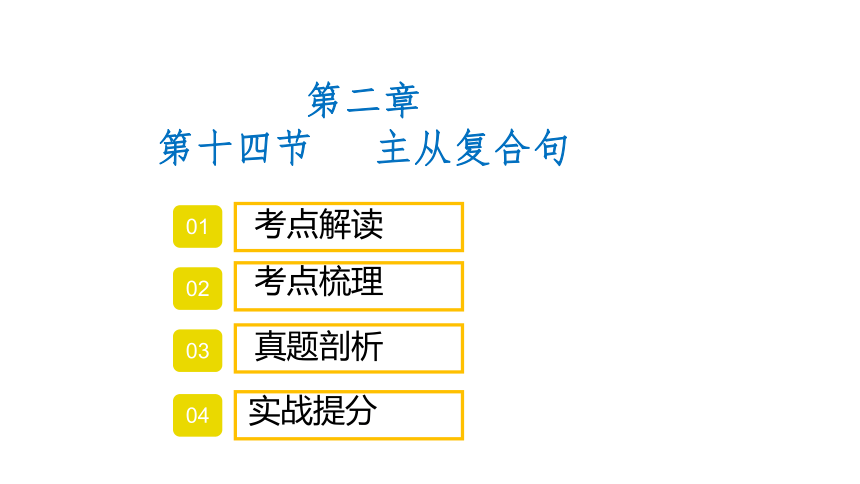 | |
| 格式 | pptx | ||
| 文件大小 | 447.8KB | ||
| 资源类型 | 教案 | ||
| 版本资源 | 牛津译林版 | ||
| 科目 | 英语 | ||
| 更新时间 | 2022-05-11 22:50:35 | ||
图片预览

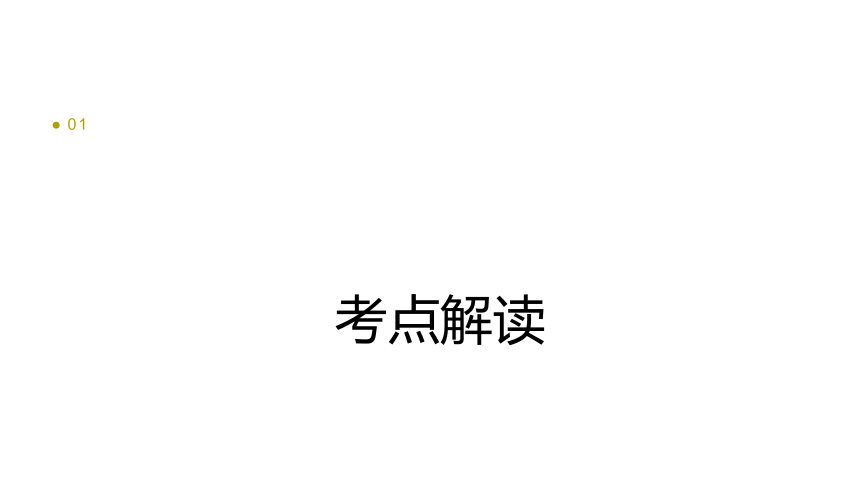
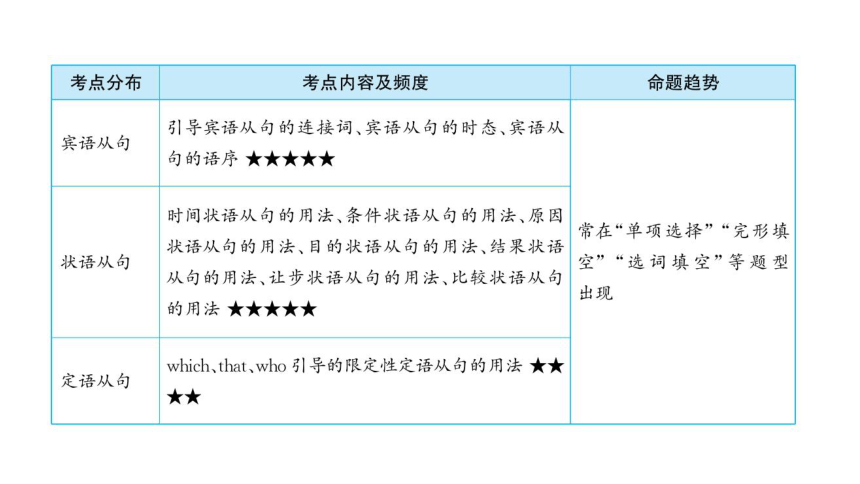
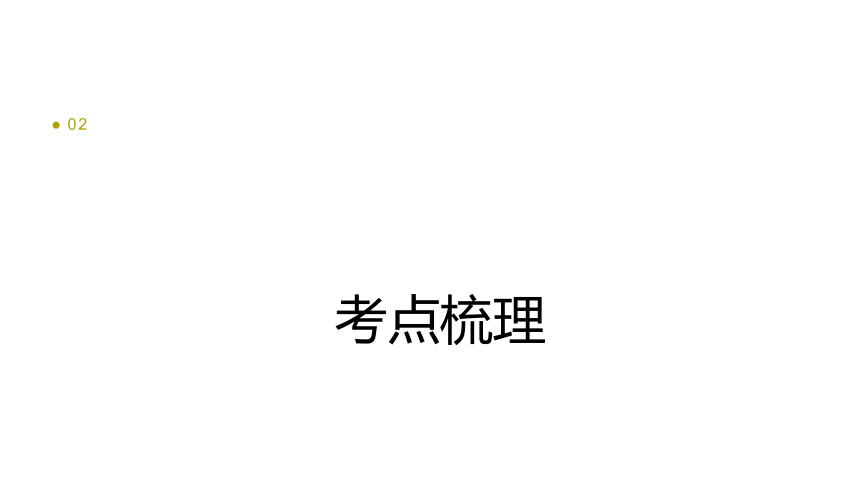
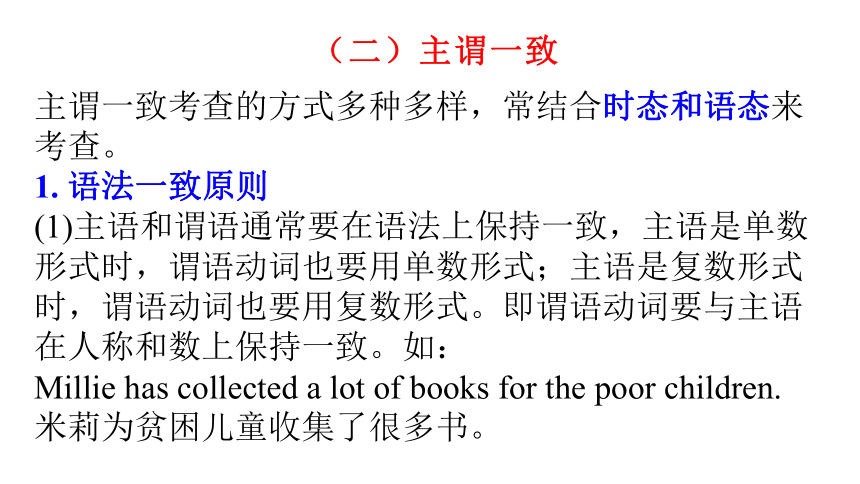
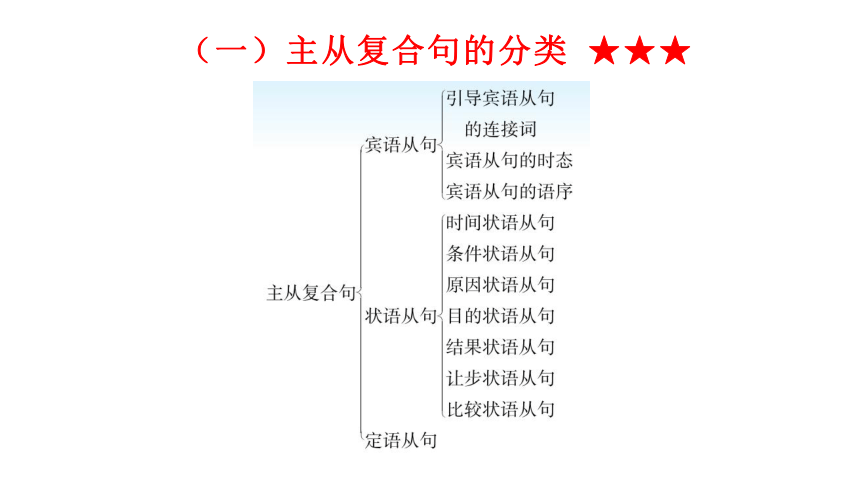
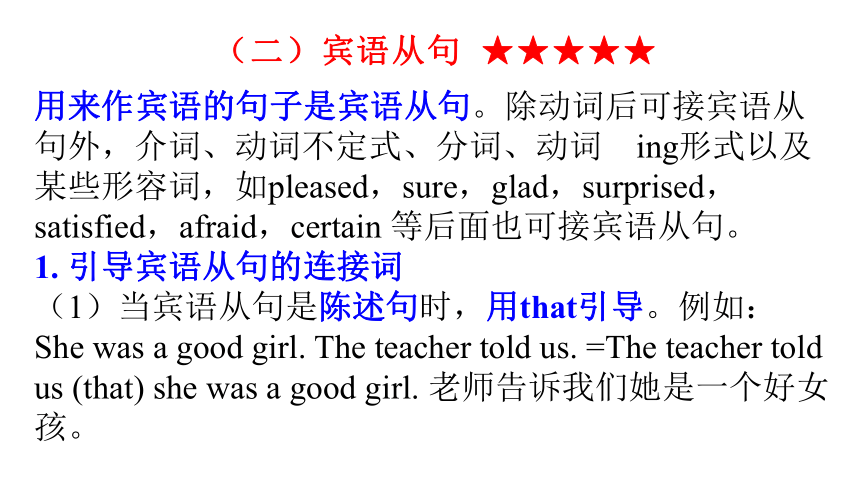
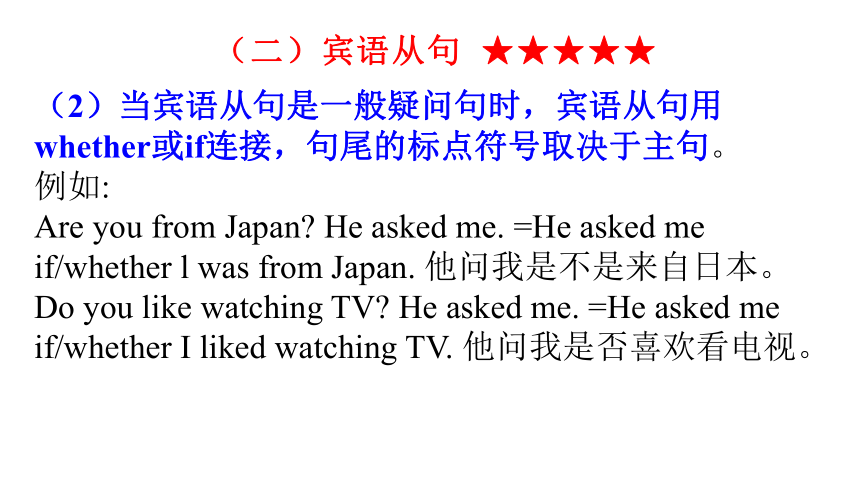
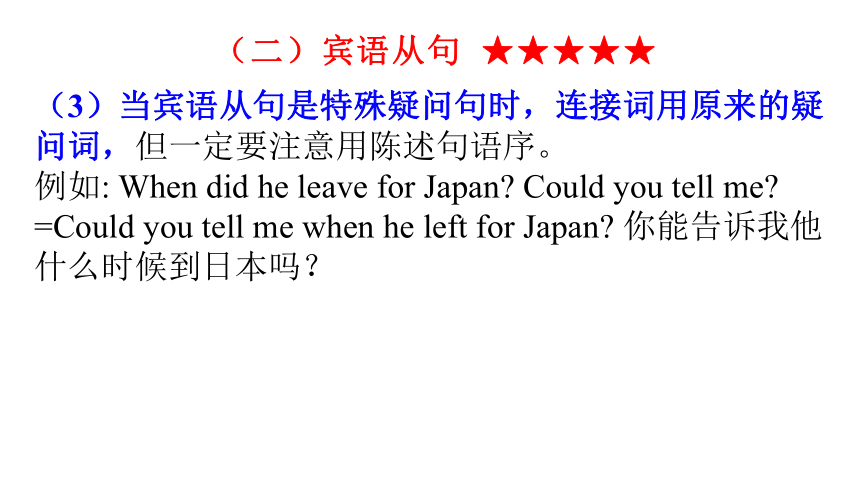
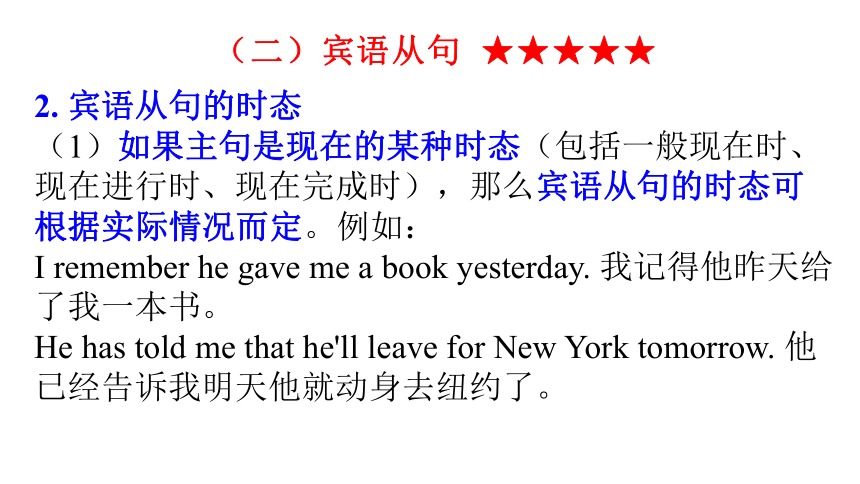
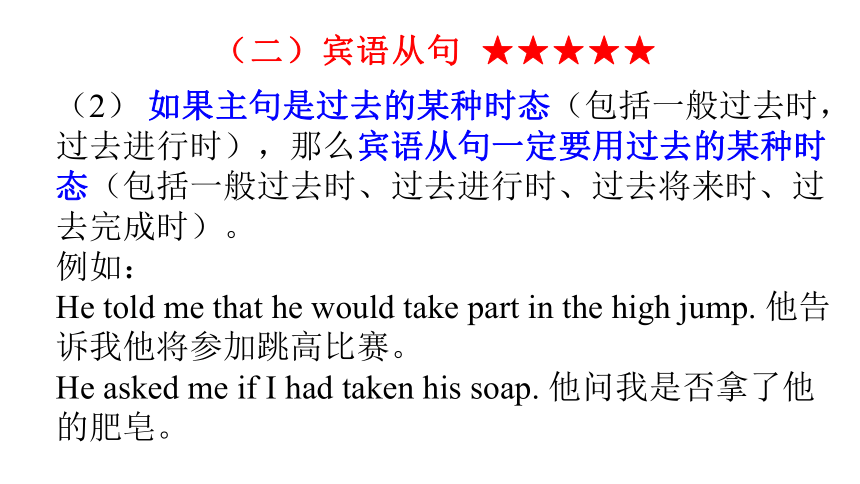
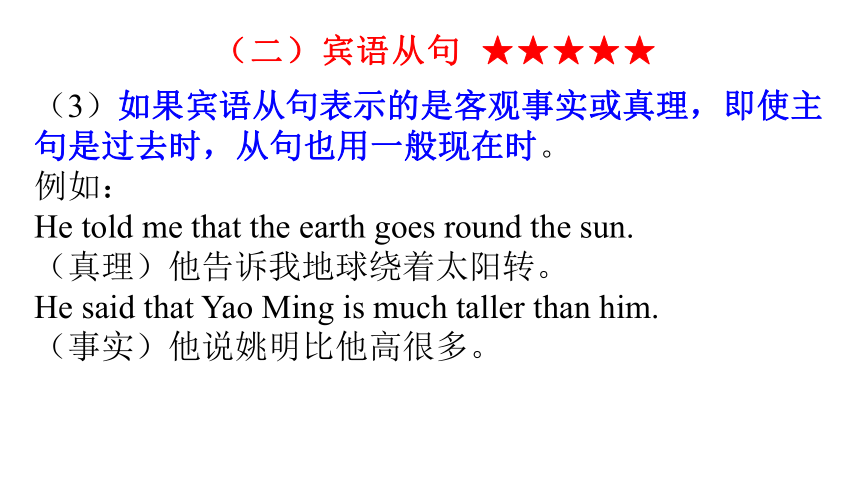
文档简介
(共64张PPT)
01
考点解读
02
03
04
考点梳理
真题剖析
实战提分
第二章
第十四节 主从复合句
01
考点解读
02
考点梳理
(二)主谓一致
主谓一致考查的方式多种多样,常结合时态和语态来考查。
1. 语法一致原则
(1)主语和谓语通常要在语法上保持一致,主语是单数形式时,谓语动词也要用单数形式;主语是复数形式时,谓语动词也要用复数形式。即谓语动词要与主语在人称和数上保持一致。如:
Millie has collected a lot of books for the poor children. 米莉为贫困儿童收集了很多书。
(一)主从复合句的分类 ★★★
(二)宾语从句 ★★★★★
用来作宾语的句子是宾语从句。除动词后可接宾语从句外,介词、动词不定式、分词、动词?ing形式以及某些形容词,如pleased,sure,glad,surprised,satisfied,afraid,certain 等后面也可接宾语从句。
1. 引导宾语从句的连接词
(1)当宾语从句是陈述句时,用that引导。例如:
She was a good girl. The teacher told us. =The teacher told us (that) she was a good girl. 老师告诉我们她是一个好女孩。
(二)宾语从句 ★★★★★
(2)当宾语从句是一般疑问句时,宾语从句用whether或if连接,句尾的标点符号取决于主句。
例如:
Are you from Japan He asked me. =He asked me if/whether l was from Japan. 他问我是不是来自日本。
Do you like watching TV He asked me. =He asked me if/whether I liked watching TV. 他问我是否喜欢看电视。
(二)宾语从句 ★★★★★
(3)当宾语从句是特殊疑问句时,连接词用原来的疑问词,但一定要注意用陈述句语序。
例如: When did he leave for Japan Could you tell me =Could you tell me when he left for Japan 你能告诉我他什么时候到日本吗?
(二)宾语从句 ★★★★★
2. 宾语从句的时态
(1)如果主句是现在的某种时态(包括一般现在时、现在进行时、现在完成时),那么宾语从句的时态可根据实际情况而定。例如:
I remember he gave me a book yesterday. 我记得他昨天给了我一本书。
He has told me that he'll leave for New York tomorrow. 他已经告诉我明天他就动身去纽约了。
(二)宾语从句 ★★★★★
(2) 如果主句是过去的某种时态(包括一般过去时,过去进行时),那么宾语从句一定要用过去的某种时态(包括一般过去时、过去进行时、过去将来时、过去完成时)。
例如:
He told me that he would take part in the high jump. 他告诉我他将参加跳高比赛。
He asked me if I had taken his soap. 他问我是否拿了他的肥皂。
(二)宾语从句 ★★★★★
(3)如果宾语从句表示的是客观事实或真理,即使主句是过去时,从句也用一般现在时。
例如:
He told me that the earth goes round the sun.
(真理)他告诉我地球绕着太阳转。
He said that Yao Ming is much taller than him.
(事实)他说姚明比他高很多。
(二)宾语从句 ★★★★★
3. 宾语从句的语序
宾语从句的语序要用陈述句的语序。在把两个独立的句子连成一个含有宾语从句的复合句时,要特别注意从句的语序,即按照主语、谓语的顺序。
例如:
What's Kate's email address Do you know
=Do you know what Kate's email address is
你知道凯特的邮箱地址吗?
(三)状语从句 ★★★★★
状语从句在复合句中起状语的作用,修饰主句中的谓语动词、形容词或副词,状语从句由从属连词引导,从属连词在句中不充当句子成分,只起连接作用。根据意义上的不同,状语从句可分为:时间状语从句、地点状语从句、原因状语从句、目的状语从句、方式状语从句、条件状语从句、结果状语从句、让步状语从句、比较状语从句等。
(三)状语从句 ★★★★★
1. 时间状语从句
(1)时间状语从句一般不用将来时,如果主句为一般将来时、祈使句或含有将来的意味,由when,as soon as,till/until,before引导的时间状语从句用一般现在时代替一般将来时。例如:
She won't leave until you agree with her. 直到你同意,她才会离开。
I was watching TV when my mother got home yesterday. 昨天我妈妈到家时我正在看电视。
(三)状语从句 ★★★★★
(2)when,as,while都意为“当……时候”,但 when引导时间状语从句的动作和主句的动作可以是同时发生,也可以是先后发生,when既可表示时间点,也可表示一段时间;用as,while时则强调主句和从句的动作同时发生;while只能表示一段时间,从句则须用延续性动词。
(三)状语从句 ★★★★★
【注意】 当主从句的动作均发生在过去时,when和while引导的时间状语从句的主从句时态一致性的确定方法为:主从复合句中,主句谓语动词动作在从句谓语动词动作之前发生,且进行的时间较长时,主句用过去进行时,从句用一般过去时。
例如:
We were talking about the film when the teacher came in. 老师进来时我们正在谈论这部电影。
主句动作和从句动作都已完成,则先发生的动作可用过去完成时,后发生的动作用一般过去时。例如:
When he had finished his homework, he went swimming. 他做完了作业后,便去游泳了。
(三)状语从句 ★★★★★
(3)till和until都意为“直到……为止”,主句用延续性动词,主句和从句都用肯定式;表示“直到……才”时,主句用终止性动词,从句用肯定式,主句用否定式。例如:
I did not go to bed until I finished my homework. 直到做完作业我才上床睡觉。
I'll wait for you until/till you come to see me. 我会一直等,直到你来看我。
(三)状语从句 ★★★★★
(4) since引导时间状语从句一般用一般过去时,被其修饰的主句则用现在完成时;“It has been...since+从句”结构中,主句也可用一般现在时,即“It is...since+从句”结构。例如:
Miss Wang has worked in the school since she came here in1989. 自从1989 年她来到这里,王小姐便在这所学校工作了。
It is /has been ten years since I studied English. 我学英语已经十年了。
(三)状语从句 ★★★★★
2. 原因状语从句
原因状语从句是指在复合句中表示主句动作发生原因的句子。
(1)because指直接原因,常表示必然的因果关系,引导的原因状语从句是全句意思的重心,它引导的从句一般放在主句后面。例如:
I did not go to school yesterday because l was ill. 我昨天没去上学, 因为我生病了。
(三)状语从句 ★★★★★
(2)as所引导的从句表示的是不言而喻、为人所知的、显而易见的原因和理由,其从句一般放在主句前。
例如:
As it is raining,you'd better take a taxi. 既然在下雨,你最好乘出租车。
(3)since意思是“既然;由于;因为”,表示已知的、显然的理由,较正式,多位于句首。例如:
Since it is late, I shall go home right now. (由于)时间不早了,我得马上回家。
(三)状语从句 ★★★★★
3. 条件状语从句
(1) 主句为一般将来时、祈使句或含有情态动词时,从句用一般现在时。如:
I'll visit the Great Wall if it doesn't rain tomorrow. 如果明天不下雨,我将去游长城。
(2)如果if引导的条件状语从句所表示的前提或条件是将来可以实现或正在进行的,动词要用现在完成时或进行时,主句通常用将来时。例如:
We will give you a good price if you are thinking of buying it. 如果你考虑买它,我们会给你一个好价钱。
(三)状语从句 ★★★★★
(3)“祈使句+and/or引导的结果状语从句”中,祈使句在意义上相当于一个条件状语从句。
例如:
Use your head,and you'll find a way. 动动脑筋,你就会想出办法来。
(三)状语从句 ★★★★★
4. 结果状语从句
结果状语从句一般由so...that...(如此……以致……),such...that...(如此……以致……)等引导。
(1)so...that...短语中的so为副词,修饰形容词或副词,that引导结果状语从句,与so相呼应,修饰前面的形容词或副词,从句中一般不含情态动词。
例如:
It was so cold that we had to wear thick clothes. 天太冷我们不得不穿上厚衣服。
(三)状语从句 ★★★★★
(2)such...that...用于引导结果状语从句,其中such为形容词,主要用于修饰名词,后接复数可数名词。若修饰单数可数名词时,a/an要放在such后。例如:
Mike is such an honest man that we all believe him. 迈克是个很诚实的人,大家都相信他。
(三)状语从句 ★★★★★
(3) so...that...与such...that...的区别是:so为副词,主要用于修饰形容词或副词;such后接名词。若形容词后有修饰的单数可数名词时,a/an要放在形容词后。
例如:
That is so nice a cat that we all like it.那是一只这么好的猫,我们都喜欢它。
(三)状语从句 ★★★★★
(4)so...that...引导的状语从句如果是否定意义,可以变为too...to...结构的简单句。
例如:
The girl is so young that she can't go to school.
=The girl is too young to go to school.
这女孩年龄太小,不能去上学。
(三)状语从句 ★★★★★
5. 目的状语从句
(1)目的状语从句用以说明主句动作发生的目的。
例如:
Say it louder so that everyone can hear you. 大声说,让大家都能听到你。
I am going to take an early bus so that I will get there in time. 我打算乘早班公共汽车,以便及时赶到那里。
(三)状语从句 ★★★★★
(2)我们常用so that引导目的状语从句,其中so that意思是“以便”,可以与in order that相替换。例如:
We will come at eight so that the meeting can begin early. 我们八点来,以便会议能早点开始。
(3)在目的状语从句中,多使用情态动词can、may、will、could、might、would或should等。例如:
I got up early so that I could catch the first bus. 我起得很早,目的是为了赶上首班公共汽车。
(三)状语从句 ★★★★★
6. 让步状语从句
(1)让步状语从句由although,though(虽然;尽管)等引导。让步状语从句表示即便出现从句中的情况,主句动作仍然会发生,有“退一步说……”的意思。例如:
I will try it although I may fail. 即使我可能失败,我也要试一下。
Though he did not have much money, he was still happy. 虽然他不富有,但他很快乐。
(三)状语从句 ★★★★★
(2)although和though 常用来引导让步状语从句,这两个连词意思大致相同,在一般情况下可以互换使用。在口语中,though较常使用,although比though更正式一些。although和though意思是“尽管”“虽然”“即使”。例如:
Although/Though it was only eight o'clock, there were few people in the streets 虽然才八点钟,街上就没什么人了。
(三)状语从句 ★★★★★
(3)although和though引导的让步状语从句不能和but连用,但可以同yet连用。例如:
Although/Though you are a little younger than me, yet you are much taller. (正确)
Although/Though you are a little younger than me, but you are much taller. (错误)
(三)状语从句 ★★★★★
7. 比较状语从句
比较状语从句由than比, as...as和……一样, not as/so...as和……不一样 等连词引导。例如:
There are more students in No. 1 Middle School than in No. 2 Middle School. 一中的学生比二中的学生多。
(四)定语从句 ★★★
在复合句中用作定语的从句称为定语从句。定语从句通常位于所修饰的名词或代词之后,常由关系代词或关系副词引出,被修饰的词称为先行词。常见的关系代词有:who, whom, which, that, whose,关系副词有when, why, where。
例如:
You said you couldn't understand people who talked fast.你说过你不能明白说话快的人的意思。
I like music that I can dance to. 我喜欢跟随音乐跳舞。
上面两句中的people和music是定语从句所修饰的词,叫先行词,定语从句放在先行词的后面。
(四)定语从句 ★★★
1. 先行词为指人的名词或代词时,定语从句用who或 that 来引导。例如:
Do you know the girl who is in a red dress. 你认识那个穿红衣服的女孩吗?
The man who we saw that day hasn't come here yet. 那天我们见到的那个人还没有来这儿。
2. 先行词是指物的名词或代词时,用which或that,which或that在从句中做主语或宾语。例如:
She works in a shoe factory which/that is far from here. 她在离这儿很远的一家鞋厂工作。
(四)定语从句 ★★★
3. 只能用关系代词that引导的定语从句的几种情况:
(1)当先行词是anything, nothing, everything 等不定代词时。例如:
I'm sorry to tell you that there is nothing that I can do for you. 很抱歉告诉你,我帮不上忙。
Is there anything that you want to buy in town 你在城里有什么东西要买吗?
(四)定语从句 ★★★
(2)当先行词是最高级或被最高级修饰时。
例如:
This is the best way that can solve the problem. 这是解决问题的最好办法。
This is the most beautiful flower that I have seen. 这是我看到的最美的花。
(四)定语从句 ★★★
(3)当先行词被 first, last, only, very, no,just, any, little 等词修饰时。例如:
She asked for the last book that was on the subject. 她要了有关这个科目的最后一本书。
This is the only one that I'm looking for. 这是我正在找的唯一的一个。
The first thing that we can do is to put all things onto the truck. 现在我们首先要做的是把所有的东西都放到卡车上。
(四)定语从句 ★★★
4. 当who为疑问代词时,引导特殊疑问句;当 who为关系代词时,引导定语从句,其用法如下:
(1) who引导的定语从句的先行词为表示人的名词或代词。例如:
The boy who is standing under the tree is my brother. 那个站在树底下的男孩是我的兄弟。
(四)定语从句 ★★★
(2)who在定语从句中做主语时不能省略;但在非正式英语中,who也可作宾语,且可以省略。例如:
The person who was here yesterday is a doctor. 昨天来这儿的那个人是个医生。
The girl (who) I saw just now is Miss Liu. 我刚才见到的那女孩是刘小姐。
(四)定语从句 ★★★
(3) 在定语从句中,who在人称、数和其前面的先行词保持一致。例如:
Do you know the girl who is standing over there 你认识站在那边的那个女孩吗?
(4) 若先行词中既有人又有物时,关系代词用that,而不用who。例如:
He watched the children and boxes that filled the car. 他看见了塞满汽车的孩子和盒子。
(四)定语从句 ★★★
(5)若先行词前面有形容词最高级、序数词修饰,关系代词用that而不用who。例如:
Yao Ming is the best basketball player that I know. 姚明是我知道的最好的篮球运动员。
03
真题剖析
真题链接
【例1】(2020年北京)—Do you know
—At 9:00 tomorrow morning.
A. when the video meeting began
B. when did the video meeting begin
C. when the video will begin
D. when will the video meeting begin
【解析】此题考查宾语从句的语序和时态。根据答语可知此处是用一般将来时,宾语从句用陈述句语序。故选C。
真题链接
【例2】—Do you like the weekly talk show, The Reader, on CCTV?
—Sure. It's a great TV programme brings the habit of reading to the public.
A. who B. that C. what
【解析】who意思是“谁”引导定语从句的时候,在从句中作主语;that意思是“那个”引导定语从句的时候,在从句中作主语或宾语;what不能引导定语从句。根据“a great TV programme”一个很棒的电视节目,可知这是一个表示物的先行词,所以要用that来引导定语从句,综上所述,故选B。
真题链接
【例3】(2020年成都)The book cover has a beautiful picture is Lily's.
A. which B. whose C. that
【解析】此题考查定语从句引导词辨析。句意:那本封面有一幅美丽的图画的书是莉莉的。分析句子结构可知,此处在句子中做定语,应用whose。故选B。
真题链接
【例4】(2020年青海)We'll never forget those lost their lives for our country.
A. who B. which C. whom
【解析】此题考查定语从句引导词辨析。分析句子结构可知,关系词在定语从句做主语,根据句意可知,先行词指代人,应用who。故选A。
真题链接
【例5】(2020年连云港)I have some tickets for the football match. I called my friends to see____________ .
A. where did they buy them
B. why they liked to go there
C. when did we go together
D. whether they'd like to go
【解析】此题考查宾语从句的引导词和语序。宾语从句用陈述句语序,排除A、C。由句意可知,此处打电话是为了想知道朋友们是否愿意去看足球比赛。故选D。
真题链接
【例6】(2018年柳州)Please give me a call you come back.
A. until B. as soon as C. while
【解析】此题考查时间状语从句引导词。句意:请你一回来就给我打电话。until直到,as soon as一……就……,while当……时。结合语境可知是嘱咐别人一回来就打电话,应用as soon as。故选B。
真题链接
【例7】(2019年桂林)Do you know the students like the mobile phone game so much
A. what B. why C. how
【解析】此题考查宾语从句引导词。句意:你知道为什么学生们如此喜欢手机游戏吗?根据句意可知此处指学生们为什么喜欢手机游戏。引导词应用why。故选B。
易错剖析
【例1】Please tell me last year.
A. where does your sister work
B. where did your sister work
C. where your sister works
D. where your sister worked
【解析】此题容易误选B和C。本题考查对宾语从句的掌握。选择B的人没有掌握宾语从句要用陈述语序,选择C的人没有掌握宾语从句中的时态用法,last year 表示过去时,所以答案是D。
易错剖析
【例2】—Can you guess if they to play basketball with us?
—I think they'll come if they free.
A. will come; will be B. will come; are
C. come; are D. come; will be
【解析】此题容易误选A。一方面由于不了解if 在本句中引导两个从句,第一句引导的是宾语从句,第二句if 引导的是条件状语从句;另一方面不掌握从句中时态的用法。根据句意第一句用一般将来时,第二句主句用了一般将来时从句要用一般现在时,所以答案是B。
04
实战提分
基础过关
词形转换。用所给动词的正确形式填空。
I won't return the book to the library because I
(not finish) reading it.
2. As soon as he saw me, he (stop)to speak to me.
3. I hope he (come) back in a week.
4. It (rain) hard when I got to the factory this morning.
5. The old man told the children (not walk) in the rice fields.
haven't finished
stopped
will come
was raining
not to walk
基础过关
6. If it (not rain) tomorrow, we
(visit) the People's Museum.
7. John (write) something when I
(go) to see him.
8. Our teacher told us that light (travel) much faster than sound.
9. Will you come and stay with us for a while when you
(finish) doing your homework
10. Please tell me if she (come) again next time.
doesn't rain
will visit
was writing
went
travels
finish
will come
拓展提升
单项选择。从下列每小题所给的选项中,选出可以填入空白处的最佳选项。
1. I told the young boy .
A. that the sun rose in the east
B. he would leave for Beijing for 2 months
C. who to make friends with him
D. which was the way to the bookshop
拓展提升
2. (2020年天津)—Do you know to see the Beijing Opera
—Yes, you can go to Mei Lanfang Theatre.
A. where can we go B. where we can go
C. when shall we go D. when we shall go
3. (2020年北京)If you take this train, you in Shanghai in five hours.
A. arrive B. will arrive
C. arrived D. have arrived
拓展提升
4. (2020年怀化)—Do you like the song Shao Nian
—Yes. I like the songs I can sing along with.
A. that B. who C. what
5. Do you know the way to the company your father works?
A. that B. which
C. in which D. in whom
拓展提升
6. —Keep working hard, Paul. You will surely realize your dream of being a writer you give it up halfway.
—I will, thank you, Miss Rowling.
A. unless B. if
C. since D. though
7. I don't care how you do the job. I only care
it can be done. Just give me a date!
A. where B. when
C. what D. why
拓展提升
8. —I've just received a Wechat message -“ttyl”. Do you know
—It stands for “talk to you later”.
A. how does it mean B. how it means
C. what does it mean D. what it means
9. Mom, have you seen my toy bear I don't know I have left it.
A. why B. when
C. how D. where
拓展提升
10. You will never achieve success you devote yourself to your work.
A. after B. if
C. because D. unless
11. The car my uncle had just bought was destroyed in the earthquake.
A. whose B. whom
C. who D. which
拓展提升
12. Mr. Li is an English teacher loved playing soccer.
A. who B. whom
C. he D. which
13. —Do you know if he will come tomorrow
—No. But if he , I'll call you to have a meal together.
A. will come B. won't come
C. comes D. doesn't come
拓展提升
14. The book he bought yesterday is very interesting.
A. / B. why
C. when D. what
15. I don't know Tom will go or not.
A. what B. whether
C. how D. if
本 课 结 束
01
考点解读
02
03
04
考点梳理
真题剖析
实战提分
第二章
第十四节 主从复合句
01
考点解读
02
考点梳理
(二)主谓一致
主谓一致考查的方式多种多样,常结合时态和语态来考查。
1. 语法一致原则
(1)主语和谓语通常要在语法上保持一致,主语是单数形式时,谓语动词也要用单数形式;主语是复数形式时,谓语动词也要用复数形式。即谓语动词要与主语在人称和数上保持一致。如:
Millie has collected a lot of books for the poor children. 米莉为贫困儿童收集了很多书。
(一)主从复合句的分类 ★★★
(二)宾语从句 ★★★★★
用来作宾语的句子是宾语从句。除动词后可接宾语从句外,介词、动词不定式、分词、动词?ing形式以及某些形容词,如pleased,sure,glad,surprised,satisfied,afraid,certain 等后面也可接宾语从句。
1. 引导宾语从句的连接词
(1)当宾语从句是陈述句时,用that引导。例如:
She was a good girl. The teacher told us. =The teacher told us (that) she was a good girl. 老师告诉我们她是一个好女孩。
(二)宾语从句 ★★★★★
(2)当宾语从句是一般疑问句时,宾语从句用whether或if连接,句尾的标点符号取决于主句。
例如:
Are you from Japan He asked me. =He asked me if/whether l was from Japan. 他问我是不是来自日本。
Do you like watching TV He asked me. =He asked me if/whether I liked watching TV. 他问我是否喜欢看电视。
(二)宾语从句 ★★★★★
(3)当宾语从句是特殊疑问句时,连接词用原来的疑问词,但一定要注意用陈述句语序。
例如: When did he leave for Japan Could you tell me =Could you tell me when he left for Japan 你能告诉我他什么时候到日本吗?
(二)宾语从句 ★★★★★
2. 宾语从句的时态
(1)如果主句是现在的某种时态(包括一般现在时、现在进行时、现在完成时),那么宾语从句的时态可根据实际情况而定。例如:
I remember he gave me a book yesterday. 我记得他昨天给了我一本书。
He has told me that he'll leave for New York tomorrow. 他已经告诉我明天他就动身去纽约了。
(二)宾语从句 ★★★★★
(2) 如果主句是过去的某种时态(包括一般过去时,过去进行时),那么宾语从句一定要用过去的某种时态(包括一般过去时、过去进行时、过去将来时、过去完成时)。
例如:
He told me that he would take part in the high jump. 他告诉我他将参加跳高比赛。
He asked me if I had taken his soap. 他问我是否拿了他的肥皂。
(二)宾语从句 ★★★★★
(3)如果宾语从句表示的是客观事实或真理,即使主句是过去时,从句也用一般现在时。
例如:
He told me that the earth goes round the sun.
(真理)他告诉我地球绕着太阳转。
He said that Yao Ming is much taller than him.
(事实)他说姚明比他高很多。
(二)宾语从句 ★★★★★
3. 宾语从句的语序
宾语从句的语序要用陈述句的语序。在把两个独立的句子连成一个含有宾语从句的复合句时,要特别注意从句的语序,即按照主语、谓语的顺序。
例如:
What's Kate's email address Do you know
=Do you know what Kate's email address is
你知道凯特的邮箱地址吗?
(三)状语从句 ★★★★★
状语从句在复合句中起状语的作用,修饰主句中的谓语动词、形容词或副词,状语从句由从属连词引导,从属连词在句中不充当句子成分,只起连接作用。根据意义上的不同,状语从句可分为:时间状语从句、地点状语从句、原因状语从句、目的状语从句、方式状语从句、条件状语从句、结果状语从句、让步状语从句、比较状语从句等。
(三)状语从句 ★★★★★
1. 时间状语从句
(1)时间状语从句一般不用将来时,如果主句为一般将来时、祈使句或含有将来的意味,由when,as soon as,till/until,before引导的时间状语从句用一般现在时代替一般将来时。例如:
She won't leave until you agree with her. 直到你同意,她才会离开。
I was watching TV when my mother got home yesterday. 昨天我妈妈到家时我正在看电视。
(三)状语从句 ★★★★★
(2)when,as,while都意为“当……时候”,但 when引导时间状语从句的动作和主句的动作可以是同时发生,也可以是先后发生,when既可表示时间点,也可表示一段时间;用as,while时则强调主句和从句的动作同时发生;while只能表示一段时间,从句则须用延续性动词。
(三)状语从句 ★★★★★
【注意】 当主从句的动作均发生在过去时,when和while引导的时间状语从句的主从句时态一致性的确定方法为:主从复合句中,主句谓语动词动作在从句谓语动词动作之前发生,且进行的时间较长时,主句用过去进行时,从句用一般过去时。
例如:
We were talking about the film when the teacher came in. 老师进来时我们正在谈论这部电影。
主句动作和从句动作都已完成,则先发生的动作可用过去完成时,后发生的动作用一般过去时。例如:
When he had finished his homework, he went swimming. 他做完了作业后,便去游泳了。
(三)状语从句 ★★★★★
(3)till和until都意为“直到……为止”,主句用延续性动词,主句和从句都用肯定式;表示“直到……才”时,主句用终止性动词,从句用肯定式,主句用否定式。例如:
I did not go to bed until I finished my homework. 直到做完作业我才上床睡觉。
I'll wait for you until/till you come to see me. 我会一直等,直到你来看我。
(三)状语从句 ★★★★★
(4) since引导时间状语从句一般用一般过去时,被其修饰的主句则用现在完成时;“It has been...since+从句”结构中,主句也可用一般现在时,即“It is...since+从句”结构。例如:
Miss Wang has worked in the school since she came here in1989. 自从1989 年她来到这里,王小姐便在这所学校工作了。
It is /has been ten years since I studied English. 我学英语已经十年了。
(三)状语从句 ★★★★★
2. 原因状语从句
原因状语从句是指在复合句中表示主句动作发生原因的句子。
(1)because指直接原因,常表示必然的因果关系,引导的原因状语从句是全句意思的重心,它引导的从句一般放在主句后面。例如:
I did not go to school yesterday because l was ill. 我昨天没去上学, 因为我生病了。
(三)状语从句 ★★★★★
(2)as所引导的从句表示的是不言而喻、为人所知的、显而易见的原因和理由,其从句一般放在主句前。
例如:
As it is raining,you'd better take a taxi. 既然在下雨,你最好乘出租车。
(3)since意思是“既然;由于;因为”,表示已知的、显然的理由,较正式,多位于句首。例如:
Since it is late, I shall go home right now. (由于)时间不早了,我得马上回家。
(三)状语从句 ★★★★★
3. 条件状语从句
(1) 主句为一般将来时、祈使句或含有情态动词时,从句用一般现在时。如:
I'll visit the Great Wall if it doesn't rain tomorrow. 如果明天不下雨,我将去游长城。
(2)如果if引导的条件状语从句所表示的前提或条件是将来可以实现或正在进行的,动词要用现在完成时或进行时,主句通常用将来时。例如:
We will give you a good price if you are thinking of buying it. 如果你考虑买它,我们会给你一个好价钱。
(三)状语从句 ★★★★★
(3)“祈使句+and/or引导的结果状语从句”中,祈使句在意义上相当于一个条件状语从句。
例如:
Use your head,and you'll find a way. 动动脑筋,你就会想出办法来。
(三)状语从句 ★★★★★
4. 结果状语从句
结果状语从句一般由so...that...(如此……以致……),such...that...(如此……以致……)等引导。
(1)so...that...短语中的so为副词,修饰形容词或副词,that引导结果状语从句,与so相呼应,修饰前面的形容词或副词,从句中一般不含情态动词。
例如:
It was so cold that we had to wear thick clothes. 天太冷我们不得不穿上厚衣服。
(三)状语从句 ★★★★★
(2)such...that...用于引导结果状语从句,其中such为形容词,主要用于修饰名词,后接复数可数名词。若修饰单数可数名词时,a/an要放在such后。例如:
Mike is such an honest man that we all believe him. 迈克是个很诚实的人,大家都相信他。
(三)状语从句 ★★★★★
(3) so...that...与such...that...的区别是:so为副词,主要用于修饰形容词或副词;such后接名词。若形容词后有修饰的单数可数名词时,a/an要放在形容词后。
例如:
That is so nice a cat that we all like it.那是一只这么好的猫,我们都喜欢它。
(三)状语从句 ★★★★★
(4)so...that...引导的状语从句如果是否定意义,可以变为too...to...结构的简单句。
例如:
The girl is so young that she can't go to school.
=The girl is too young to go to school.
这女孩年龄太小,不能去上学。
(三)状语从句 ★★★★★
5. 目的状语从句
(1)目的状语从句用以说明主句动作发生的目的。
例如:
Say it louder so that everyone can hear you. 大声说,让大家都能听到你。
I am going to take an early bus so that I will get there in time. 我打算乘早班公共汽车,以便及时赶到那里。
(三)状语从句 ★★★★★
(2)我们常用so that引导目的状语从句,其中so that意思是“以便”,可以与in order that相替换。例如:
We will come at eight so that the meeting can begin early. 我们八点来,以便会议能早点开始。
(3)在目的状语从句中,多使用情态动词can、may、will、could、might、would或should等。例如:
I got up early so that I could catch the first bus. 我起得很早,目的是为了赶上首班公共汽车。
(三)状语从句 ★★★★★
6. 让步状语从句
(1)让步状语从句由although,though(虽然;尽管)等引导。让步状语从句表示即便出现从句中的情况,主句动作仍然会发生,有“退一步说……”的意思。例如:
I will try it although I may fail. 即使我可能失败,我也要试一下。
Though he did not have much money, he was still happy. 虽然他不富有,但他很快乐。
(三)状语从句 ★★★★★
(2)although和though 常用来引导让步状语从句,这两个连词意思大致相同,在一般情况下可以互换使用。在口语中,though较常使用,although比though更正式一些。although和though意思是“尽管”“虽然”“即使”。例如:
Although/Though it was only eight o'clock, there were few people in the streets 虽然才八点钟,街上就没什么人了。
(三)状语从句 ★★★★★
(3)although和though引导的让步状语从句不能和but连用,但可以同yet连用。例如:
Although/Though you are a little younger than me, yet you are much taller. (正确)
Although/Though you are a little younger than me, but you are much taller. (错误)
(三)状语从句 ★★★★★
7. 比较状语从句
比较状语从句由than比, as...as和……一样, not as/so...as和……不一样 等连词引导。例如:
There are more students in No. 1 Middle School than in No. 2 Middle School. 一中的学生比二中的学生多。
(四)定语从句 ★★★
在复合句中用作定语的从句称为定语从句。定语从句通常位于所修饰的名词或代词之后,常由关系代词或关系副词引出,被修饰的词称为先行词。常见的关系代词有:who, whom, which, that, whose,关系副词有when, why, where。
例如:
You said you couldn't understand people who talked fast.你说过你不能明白说话快的人的意思。
I like music that I can dance to. 我喜欢跟随音乐跳舞。
上面两句中的people和music是定语从句所修饰的词,叫先行词,定语从句放在先行词的后面。
(四)定语从句 ★★★
1. 先行词为指人的名词或代词时,定语从句用who或 that 来引导。例如:
Do you know the girl who is in a red dress. 你认识那个穿红衣服的女孩吗?
The man who we saw that day hasn't come here yet. 那天我们见到的那个人还没有来这儿。
2. 先行词是指物的名词或代词时,用which或that,which或that在从句中做主语或宾语。例如:
She works in a shoe factory which/that is far from here. 她在离这儿很远的一家鞋厂工作。
(四)定语从句 ★★★
3. 只能用关系代词that引导的定语从句的几种情况:
(1)当先行词是anything, nothing, everything 等不定代词时。例如:
I'm sorry to tell you that there is nothing that I can do for you. 很抱歉告诉你,我帮不上忙。
Is there anything that you want to buy in town 你在城里有什么东西要买吗?
(四)定语从句 ★★★
(2)当先行词是最高级或被最高级修饰时。
例如:
This is the best way that can solve the problem. 这是解决问题的最好办法。
This is the most beautiful flower that I have seen. 这是我看到的最美的花。
(四)定语从句 ★★★
(3)当先行词被 first, last, only, very, no,just, any, little 等词修饰时。例如:
She asked for the last book that was on the subject. 她要了有关这个科目的最后一本书。
This is the only one that I'm looking for. 这是我正在找的唯一的一个。
The first thing that we can do is to put all things onto the truck. 现在我们首先要做的是把所有的东西都放到卡车上。
(四)定语从句 ★★★
4. 当who为疑问代词时,引导特殊疑问句;当 who为关系代词时,引导定语从句,其用法如下:
(1) who引导的定语从句的先行词为表示人的名词或代词。例如:
The boy who is standing under the tree is my brother. 那个站在树底下的男孩是我的兄弟。
(四)定语从句 ★★★
(2)who在定语从句中做主语时不能省略;但在非正式英语中,who也可作宾语,且可以省略。例如:
The person who was here yesterday is a doctor. 昨天来这儿的那个人是个医生。
The girl (who) I saw just now is Miss Liu. 我刚才见到的那女孩是刘小姐。
(四)定语从句 ★★★
(3) 在定语从句中,who在人称、数和其前面的先行词保持一致。例如:
Do you know the girl who is standing over there 你认识站在那边的那个女孩吗?
(4) 若先行词中既有人又有物时,关系代词用that,而不用who。例如:
He watched the children and boxes that filled the car. 他看见了塞满汽车的孩子和盒子。
(四)定语从句 ★★★
(5)若先行词前面有形容词最高级、序数词修饰,关系代词用that而不用who。例如:
Yao Ming is the best basketball player that I know. 姚明是我知道的最好的篮球运动员。
03
真题剖析
真题链接
【例1】(2020年北京)—Do you know
—At 9:00 tomorrow morning.
A. when the video meeting began
B. when did the video meeting begin
C. when the video will begin
D. when will the video meeting begin
【解析】此题考查宾语从句的语序和时态。根据答语可知此处是用一般将来时,宾语从句用陈述句语序。故选C。
真题链接
【例2】—Do you like the weekly talk show, The Reader, on CCTV?
—Sure. It's a great TV programme brings the habit of reading to the public.
A. who B. that C. what
【解析】who意思是“谁”引导定语从句的时候,在从句中作主语;that意思是“那个”引导定语从句的时候,在从句中作主语或宾语;what不能引导定语从句。根据“a great TV programme”一个很棒的电视节目,可知这是一个表示物的先行词,所以要用that来引导定语从句,综上所述,故选B。
真题链接
【例3】(2020年成都)The book cover has a beautiful picture is Lily's.
A. which B. whose C. that
【解析】此题考查定语从句引导词辨析。句意:那本封面有一幅美丽的图画的书是莉莉的。分析句子结构可知,此处在句子中做定语,应用whose。故选B。
真题链接
【例4】(2020年青海)We'll never forget those lost their lives for our country.
A. who B. which C. whom
【解析】此题考查定语从句引导词辨析。分析句子结构可知,关系词在定语从句做主语,根据句意可知,先行词指代人,应用who。故选A。
真题链接
【例5】(2020年连云港)I have some tickets for the football match. I called my friends to see____________ .
A. where did they buy them
B. why they liked to go there
C. when did we go together
D. whether they'd like to go
【解析】此题考查宾语从句的引导词和语序。宾语从句用陈述句语序,排除A、C。由句意可知,此处打电话是为了想知道朋友们是否愿意去看足球比赛。故选D。
真题链接
【例6】(2018年柳州)Please give me a call you come back.
A. until B. as soon as C. while
【解析】此题考查时间状语从句引导词。句意:请你一回来就给我打电话。until直到,as soon as一……就……,while当……时。结合语境可知是嘱咐别人一回来就打电话,应用as soon as。故选B。
真题链接
【例7】(2019年桂林)Do you know the students like the mobile phone game so much
A. what B. why C. how
【解析】此题考查宾语从句引导词。句意:你知道为什么学生们如此喜欢手机游戏吗?根据句意可知此处指学生们为什么喜欢手机游戏。引导词应用why。故选B。
易错剖析
【例1】Please tell me last year.
A. where does your sister work
B. where did your sister work
C. where your sister works
D. where your sister worked
【解析】此题容易误选B和C。本题考查对宾语从句的掌握。选择B的人没有掌握宾语从句要用陈述语序,选择C的人没有掌握宾语从句中的时态用法,last year 表示过去时,所以答案是D。
易错剖析
【例2】—Can you guess if they to play basketball with us?
—I think they'll come if they free.
A. will come; will be B. will come; are
C. come; are D. come; will be
【解析】此题容易误选A。一方面由于不了解if 在本句中引导两个从句,第一句引导的是宾语从句,第二句if 引导的是条件状语从句;另一方面不掌握从句中时态的用法。根据句意第一句用一般将来时,第二句主句用了一般将来时从句要用一般现在时,所以答案是B。
04
实战提分
基础过关
词形转换。用所给动词的正确形式填空。
I won't return the book to the library because I
(not finish) reading it.
2. As soon as he saw me, he (stop)to speak to me.
3. I hope he (come) back in a week.
4. It (rain) hard when I got to the factory this morning.
5. The old man told the children (not walk) in the rice fields.
haven't finished
stopped
will come
was raining
not to walk
基础过关
6. If it (not rain) tomorrow, we
(visit) the People's Museum.
7. John (write) something when I
(go) to see him.
8. Our teacher told us that light (travel) much faster than sound.
9. Will you come and stay with us for a while when you
(finish) doing your homework
10. Please tell me if she (come) again next time.
doesn't rain
will visit
was writing
went
travels
finish
will come
拓展提升
单项选择。从下列每小题所给的选项中,选出可以填入空白处的最佳选项。
1. I told the young boy .
A. that the sun rose in the east
B. he would leave for Beijing for 2 months
C. who to make friends with him
D. which was the way to the bookshop
拓展提升
2. (2020年天津)—Do you know to see the Beijing Opera
—Yes, you can go to Mei Lanfang Theatre.
A. where can we go B. where we can go
C. when shall we go D. when we shall go
3. (2020年北京)If you take this train, you in Shanghai in five hours.
A. arrive B. will arrive
C. arrived D. have arrived
拓展提升
4. (2020年怀化)—Do you like the song Shao Nian
—Yes. I like the songs I can sing along with.
A. that B. who C. what
5. Do you know the way to the company your father works?
A. that B. which
C. in which D. in whom
拓展提升
6. —Keep working hard, Paul. You will surely realize your dream of being a writer you give it up halfway.
—I will, thank you, Miss Rowling.
A. unless B. if
C. since D. though
7. I don't care how you do the job. I only care
it can be done. Just give me a date!
A. where B. when
C. what D. why
拓展提升
8. —I've just received a Wechat message -“ttyl”. Do you know
—It stands for “talk to you later”.
A. how does it mean B. how it means
C. what does it mean D. what it means
9. Mom, have you seen my toy bear I don't know I have left it.
A. why B. when
C. how D. where
拓展提升
10. You will never achieve success you devote yourself to your work.
A. after B. if
C. because D. unless
11. The car my uncle had just bought was destroyed in the earthquake.
A. whose B. whom
C. who D. which
拓展提升
12. Mr. Li is an English teacher loved playing soccer.
A. who B. whom
C. he D. which
13. —Do you know if he will come tomorrow
—No. But if he , I'll call you to have a meal together.
A. will come B. won't come
C. comes D. doesn't come
拓展提升
14. The book he bought yesterday is very interesting.
A. / B. why
C. when D. what
15. I don't know Tom will go or not.
A. what B. whether
C. how D. if
本 课 结 束
同课章节目录
- 词法
- 名词
- 动词和动词短语
- 动词语态
- 动词时态
- 助动词和情态动词
- 非谓语动词
- 冠词
- 代词
- 数词和量词
- 形容词副词及其比较等级
- 介词和介词短语
- 连词和感叹词
- 构词法
- 相似、相近词比较
- 句法
- 陈述句
- 一般疑问句和否定疑问句
- 特殊疑问句及选择疑问句
- 反意疑问句
- 存在句(There be句型)
- 宾语从句
- 定语从句
- 状语从句
- 主谓一致问题
- 简单句
- 并列句
- 复合句
- 主谓一致
- 主、表语从句
- 名词性从句
- 直接引语和间接引语
- 虚拟语气
- 感叹句
- 强调句
- 倒装句
- 祈使句
- 句子的成分
- 句子的分类
- 题型专区
- 单项选择部分
- 易错题
- 完形填空
- 阅读理解
- 词汇练习
- 听说训练
- 句型转换
- 补全对话
- 短文改错
- 翻译
- 书面表达
- 任务型阅读
- 语法填空
- 其他资料
